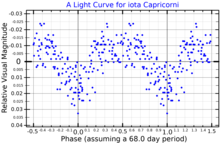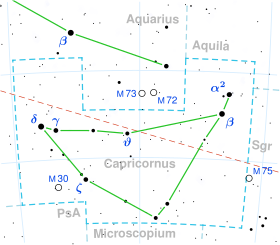| Observation data Epoch J2000.0 Equinox J2000.0 (ICRS) | |
|---|---|
| Constellation | Capricornus |
| Right ascension | 21h 22m 14.79598s[1] |
| Declination | −16° 50′ 04.3580″[1] |
| Apparent magnitude (V) | +4.296[2] |
| Characteristics | |
| Spectral type | G8 III[3] |
| U−B color index | +0.63[2] |
| B−V color index | +0.89[2] |
| Variable type | BY Dra[4] |
| Astrometry | |
| Radial velocity (Rv) | +12.31±0.13[5] km/s |
| Proper motion (μ) | RA: 29.403±0.189 mas/yr[1] Dec.: 4.909±0.123 mas/yr[1] |
| Parallax (π) | 16.2048 ± 0.1688 mas[1] |
| Distance | 201 ± 2 ly (61.7 ± 0.6 pc) |
| Absolute magnitude (MV) | +0.18[6] |
| Details[5] | |
| Mass | 2.89±0.08 M☉ |
| Radius | 10.67±0.62 R☉ |
| Luminosity | 83 L☉ |
| Surface gravity (log g) | 3.05±0.10 cgs |
| Temperature | 5,200±28 K |
| Metallicity [Fe/H] | 0.05±0.05 dex |
| Rotation | 68 d[7] |
| Rotational velocity (v sin i) | 4.37±0.45 km/s |
| Age | 390 Myr |
| Other designations | |
| Database references | |
| SIMBAD | data |
Iota Capricorni (ι Cap, ι Capricorni) is a solitary,[9] yellow-hued star in the southern constellation of Capricornus. It can be seen with the naked eye, having an apparent visual magnitude of +4.3.[2] Based upon an annual parallax shift of 16.2 mas as seen from the Earth,[1] the star is located about 201 light years from the Sun. At that distance, the visual magnitude of the star is diminished by an extinction factor of 0.08 due to interstellar dust.[5]

This is an evolved G-type giant star with a stellar classification of G8 III.[3] It is classified as a BY Draconis type[4] variable star. This is a chromospherically-active star with a longitudinal magnetic field strength of 8.3±0.6 G and an X-ray luminosity of 4.482×1030 erg s−1.[7] The activity and photometric variation of the star allow an estimate of its rotation period as 68 days.[7]
Iota Capricorni has an estimated 2.9 times the mass of the Sun and nearly 11 times the Solar radius. It is 390 million years old and is radiating 83 times the solar luminosity from its chromosphere at an effective temperature of 5,200 K.[5]
- ^ a b c d e Cite error: The named reference
GaiaDR3was invoked but never defined (see the help page). - ^ a b c d Cite error: The named reference
aaass22_9was invoked but never defined (see the help page). - ^ a b Cite error: The named reference
houk1988was invoked but never defined (see the help page). - ^ a b Cite error: The named reference
Kazarovets1997was invoked but never defined (see the help page). - ^ a b c d Cite error: The named reference
jofre2015was invoked but never defined (see the help page). - ^ Cite error: The named reference
Radick1998was invoked but never defined (see the help page). - ^ a b c Cite error: The named reference
auriere2015was invoked but never defined (see the help page). - ^ Cite error: The named reference
SIMBADwas invoked but never defined (see the help page). - ^ Cite error: The named reference
Eggleton2008was invoked but never defined (see the help page). - ^ Cite error: The named reference
Henrywas invoked but never defined (see the help page).
